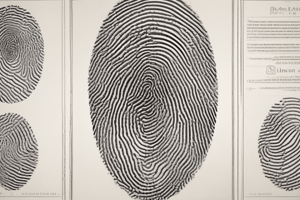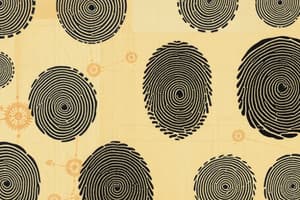Podcast
Questions and Answers
What is the primary characteristic of an arch fingerprint pattern?
What is the primary characteristic of an arch fingerprint pattern?
- Ridges that form circular patterns
- Ridges that enter and exit on the same side
- Ridges that enter on one side, rise in the center, and exit on the opposite side (correct)
- Ridges that diverge and form a triangular shape
Which fingerprint pattern is characterized by having one delta?
Which fingerprint pattern is characterized by having one delta?
- Plain arch
- Loop (correct)
- Whorl
- Accidental whorl
What distinguishes an ulnar loop from a radial loop?
What distinguishes an ulnar loop from a radial loop?
- The sharpness of the center rise
- The number of deltas present
- The direction of ridge entry and exit (correct)
- The presence of circular patterns
Which fingerprint pattern has two or more deltas?
Which fingerprint pattern has two or more deltas?
What is the significance of the delta in fingerprint analysis?
What is the significance of the delta in fingerprint analysis?
What type of fingerprint pattern merges two separate loop formations?
What type of fingerprint pattern merges two separate loop formations?
Why is fingerprint analysis considered highly reliable in forensic science?
Why is fingerprint analysis considered highly reliable in forensic science?
Which feature of a fingerprint is defined as the approximate center of its pattern?
Which feature of a fingerprint is defined as the approximate center of its pattern?
Flashcards
Arch fingerprint
Arch fingerprint
A fingerprint pattern where ridges enter from one side, rise in the center, and exit on the other side. They have no deltas.
Plain arch
Plain arch
A type of arch fingerprint where ridges enter on one side and exit on the other side with a gentle rise in the center.
Tented arch
Tented arch
A type of arch fingerprint where ridges enter on one side and rise sharply in the center, often exiting on the same side or the opposite side.
Loop fingerprint
Loop fingerprint
Signup and view all the flashcards
Radial loop
Radial loop
Signup and view all the flashcards
Ulnar loop
Ulnar loop
Signup and view all the flashcards
Whorl fingerprint
Whorl fingerprint
Signup and view all the flashcards
Importance of fingerprinting in forensics
Importance of fingerprinting in forensics
Signup and view all the flashcards
Study Notes
Fingerprint Types
- Fingerprints are unique patterns on the fingertips formed by ridges and furrows. These patterns are formed during fetal development and remain consistent throughout a person's life.
- The study of fingerprints, known as dactyloscopy, is used in forensic science to identify individuals.
Major Fingerprint Patterns
-
Arch: This pattern is characterized by ridges that enter on one side of the finger, rise in the center, and exit on the other side. They have no deltas. There are two primary types of arches: plain arches and tented arches.
- Plain arch: Ridges enter on one side, almost directly across the other.
- Tented arch: Ridges enter on one side, rise sharply in the center, and often exit on the same side or the opposite side. This is a sharper angle than a plain arch.
-
Loop: Loop patterns have ridges that enter on one side of the finger, recurve, and exit on the same side. They have one delta.
- Radial loop: The ridges enter and exit on the same side of the finger as the thumb.
- Ulnar loop: The ridges enter and exit on the same side of the finger as the pinky finger (little finger).
-
Whorl: Whorl patterns have ridges that circle around a central point. They have two or more deltas. Whorl patterns have various subtypes including plain whorls, central pocket loops, double loop whorls, and accidental whorls.
- Plain whorl: The ridges form circular or almost circular patterns.
- Central pocket loop whorl: More like a loop pattern, but it also has a small circular or spiral element to it, but has two deltas.
- Double loop whorl: Two separate loop formations merged together
- Accidental whorl: A pattern that is a combination of two or more patterns, or is irregular in shape.
Distinguishing Features
- Delta: A triangular area where ridges converge.
- Core: The approximate center of the fingerprint pattern.
Importance in Forensic Science
- Fingerprint analysis is a primary method for human identification, offering extremely high accuracy and certainty due to the unique and permanent nature of fingerprints.
- Law enforcement agencies rely on fingerprint databases to determine if a suspect has a prior criminal record or involvement in previous offenses.
- A reliable identification can occur from as little as a portion of the actual fingerprint.
Principles of Fingerprinting
- Uniqueness: No two people have identical fingerprints, even identical twins.
- Permanence: Fingerprints develop during fetal development and remain unchanged through a person's life, unless impacted by significant injury to the fingertips.
- Classification: Fingerprints are classified into categories (arches, loops, whorls) making it easier to organize and search in a database.
Studying That Suits You
Use AI to generate personalized quizzes and flashcards to suit your learning preferences.




